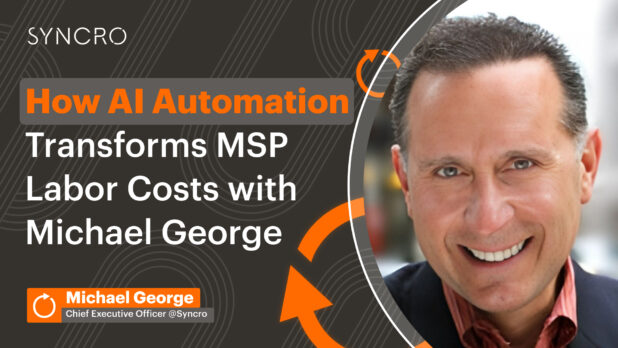Table of contents
Episode Summary
Julian Lee from eChannel News sits down to interview Michael George, CEO of Syncro, about the evolving challenges facing MSPs and how to overcome them. Michael discusses how technicians struggle with increasingly complex security demands and distributed workforces while remaining underappreciated for their critical role in keeping global infrastructure running. He emphasizes that MSPs often have overcomplicated tech stacks with too many disconnected products, creating inefficiency and security vulnerabilities that modern, unified platforms can solve.
The conversation outlines a clear blueprint for MSP success: adopting a security-first approach, maintaining dedicated sales functions to capitalize on cybersecurity incidents that drive customer transitions, and leveraging automation to reduce labor costs that typically consume 75% of operational expenses. Michael stresses that the goal isn’t staff reduction but enabling exponential growth without proportional hiring, improving both customer outcomes and technician satisfaction.
Guest-at-a-Glance
💡 Name: Michael George
💡 What they do: Chief Executive Officer
💡 Company: Syncro
💡 Noteworthy: Pioneer in MSP automation bringing the first-of-its-kind Extended Monitoring and Management (XMM)™ – a unified RMM, PSA, and Microsoft 365 management solution – to market with Syncro.
💡 Where to find them: LinkedIn
Key Insights
Platform Simplification Delivers Better Security and Experience
Most MSPs operate with complicated technology stacks built from dozens of disconnected products. This fragmentation creates inefficiency through multiple logins, inconsistent interfaces, and security gaps. Cloud-native unified platforms significantly improve both security posture and technician experience. Simplification eliminates vulnerable gaps between point solutions while creating consistent workflows. The most effective platforms incorporate AI automation targeting repetitive tasks that consume technician time without adding value.
Security-First Approach Is Now Non-Negotiable
The MSP landscape has transformed into an MSSP-dominant model. Small businesses face increasing attacks as cybercriminals find targeting thousands of smaller companies more profitable than pursuing large enterprises. This shift makes security incidents the primary reason customers switch providers. The distributed workforce has eliminated the protection of traditional office firewalls. Modern MSPs must position security at their core rather than as an add-on. Those with dedicated sales efforts will capture opportunities when incidents occur at competing providers.
Labor Costs Make or Break MSP Profitability
Labor expenses consume 70-75% of an MSP’s operational budget, dwarfing technology costs. While vendors focus on discounting software, these efforts only impact a small fraction of expenses. True profitability comes from automating repetitive tasks. Modern AI tools can eliminate 50-60% of routine work, allowing technicians to focus on higher-value activities. This creates a force multiplier effect where MSPs can scale their customer base without proportionally increasing headcount. The goal isn’t staff reduction but growth enablement — maintaining current teams while dramatically increasing their capacity and effectiveness.
Viewer Takeaways
The Problem with Product Proliferation
MSPs have accumulated too many disconnected products in their technology stacks. This fragmentation creates challenges with multiple logins, inconsistent interfaces, and incomplete coverage. The expansion occurred in both providers and products, with many platform companies growing through acquisition rather than integrated development. This leaves technicians managing a complex web that creates security gaps rather than comprehensive protection.
“I would argue today if you look inside a $2 million to $20 million MSP, they have way too many products as part of their portfolio. This layered approach with multiple products that think they’re doing the same thing creates no product – you have lots of seams and gaps, places of great vulnerability.”
Microsoft’s Critical Role in Cybersecurity
Despite most people not realizing it, Microsoft has become the world’s largest cybersecurity company while simultaneously making the largest investments in AI technologies. This combination positions them uniquely to develop advanced security solutions that integrate natively with the environments most MSPs already support. The conversation highlights how partnering with established leaders like Microsoft provides better security outcomes than chasing numerous smaller security startups.
“There isn’t another software company on the planet that has invested more in native AI technologies than Microsoft with their $13 billion investment in OpenAI. Perhaps one of the most important places we will see effective technologies emerge is in the cybersecurity space.”
The Strategic Importance of Dedicated Sales
Organizational structure must separate sales and service delivery functions. MSPs need dedicated sales efforts – even if just one person – to capitalize on opportunities created by cybersecurity concerns. With security incidents driving customer transitions between providers, focused sales presence ensures MSPs can capture these opportunities. This represents a major change vector creating constant openings for prepared providers.
The Underappreciated Role of IT Technicians
IT technicians face increasingly difficult challenges while receiving little recognition. Michael compares them to homeland security – essential but invisible until something goes wrong. The pandemic complicated security by dispersing workers outside traditional firewalls. Despite being the backbone of global technology, technicians rarely receive proper compensation or appreciation. Without IT professionals, critical infrastructure from healthcare to transportation would collapse.
Share














